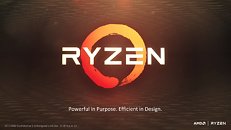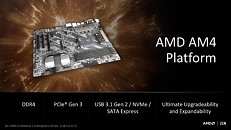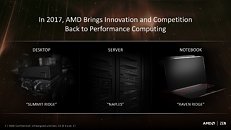Raevenlord
News Editor
- Joined
- Aug 12, 2016
- Messages
- 3,755 (1.22/day)
- Location
- Portugal
| System Name | The Ryzening |
|---|---|
| Processor | AMD Ryzen 9 5900X |
| Motherboard | MSI X570 MAG TOMAHAWK |
| Cooling | Lian Li Galahad 360mm AIO |
| Memory | 32 GB G.Skill Trident Z F4-3733 (4x 8 GB) |
| Video Card(s) | Gigabyte RTX 3070 Ti |
| Storage | Boot: Transcend MTE220S 2TB, Kintson A2000 1TB, Seagate Firewolf Pro 14 TB |
| Display(s) | Acer Nitro VG270UP (1440p 144 Hz IPS) |
| Case | Lian Li O11DX Dynamic White |
| Audio Device(s) | iFi Audio Zen DAC |
| Power Supply | Seasonic Focus+ 750 W |
| Mouse | Cooler Master Masterkeys Lite L |
| Keyboard | Cooler Master Masterkeys Lite L |
| Software | Windows 10 x64 |
At their Austin, Texas "New Horizon" Event, AMD introduced us to live "ZEN" chips working full-tilt, showing us what AMD's passion and ingenuity managed to achieve. The "New Horizon" event was a celebration to what AMD sees as another one of those special, breakthrough moments for a company: after starting work on "ZEN" 4 years ago in 2012 as a complete new design. The focus: building a great machine, whilst increasing IPC by 40% over their previous architecture, at the same power constraints; and to create a smart machine, which could sense and adapt to environment and applications so it improves over time. The company's verdicts: "ZEN" met or exceeded their goals, with the desktop PC market being home to the very first "ZEN" product.
According to AMD's CEO Dr. Lisa Su, AMD's event was named "New Horizon" as a reference to AMD's vision in the computing space: that they're on a journey to bring a new generation of processor technology, and customers towards a new horizon of computing. Their intention? To directly connect with fans who love PC gaming, whilst doing what AMD does best - pushing the envelope on performance, power, frame-rates and technology. AMD also flaunted their renewed faith in gaming, with it being on the company's DNA and passion, whilst revisiting the old memory lane, reminiscing on the Athlon Thunderbird, the world's first chip to break the 1 GHz barrier; the launch of their first 64-bit processor; and breaking the 1 TFLOP barrier in computing power with their HD 4850 and 4870 gaming GPUs.



AMD confirmed that CPUs based on their "ZEN" micro-architecture will carry the brand "Ryzen" - a play on the "ZEN" architecture's focus on balance, high performance and low power, while introducing new features. Ryzen is AMD's take of a processor that is both powerful in purpose, and efficient in design, and it symbolizes the power of "ZEN" reaching the next horizon in computing. They will do so by starting with an 8-core, 16-thread, SMT-enabled, 3.4 GHz+ base clock and 20MB combined cache new high-performance CPU, leveraging all the improvements baked into AMD's new AM4 platform (with 3.4 GHz apparently being the lowest frequency a Ryzen, consumer-level desktop solution will carry).




To prove their words and commitment to Ryzen's performance, AMD showcased the chip's prowess in a Blender test, pitting a Ryzen CPU at 3.4 GHz base clock (without Boost), with the consumer market's only other 8-core, 16-thread CPU in the Intel i7 6900K, at its stock 3.2 GHz base clock, with Boost enabled and no adjustments, "straight out of the box". The verdict: Ryzen matched the 6900K's performance. Dr. Lisa Su was quick to point out the 6900K's pricing at $1100, though she left an intentional silence at the point where she could have made a bombastic pricing announcement for Ryzen - perhaps keeping her cards close to her chest so as to not allow Intel to figure out any pricing changes in their products (if any), should Ryzen prove deserving of such a response. But the bottom line, and the home-run hit by Lisa Su, was the announcement that Ryzen was able to match Intel's performance with 45 W less TDP - 95 W TDP on Ryzen against the 140 W TDP on Intel's 6900K. In another test, this time a Handbrake transcoding demo, Ryzen transcoded a video in 54 seconds, against 59 seconds on Intel's 6900K processor.


Again at 3.4 GHz, Ryzen was shown "beating the game frame-rates of a Core i7 6900K playing Battlefield 1 at 4K resolution, with each CPU paired with an Nvidia Titan X GPU". Not drawing any more attention than needs to be drawn towards the usage of an NVIDIA solution at their own event (which was puzzling, since AMD did show a Ryzen CPU and a VEGA-based graphics cards running Star Wars Battlefront's as-of-yet unreleased Rogue One DLC at over 60fps in 4K), we didn't actually see any reported frame-rated on the Battlefield 1 demo - only that the Ryzen-based system offered considerably less frame-skipping than the Intel solution, with the expected effects that has on the gaming experience.


AMD also announced what constitutes part of Ryzen's beating heart: their SenseMI technology, which includes "Neural Net Prediction" - an artificial intelligence neural network that learns to predict what future pathway an application will take based on past runs; "Smart Prefetch", which drinks from the "Neural Net Prediction", anticipating the data an app needs and having it ready when needed (with these two features alone being responsible for 1/4 of Ryzen's performance uplift, according to Lisa Su). Additionally, AMD announced Ryzen's "Pure Power" and "Precision Boost" features: more than "100 embedded sensors with accuracy to the millivolt, milliwatt, and single degree level of temperature enable optimal voltage, clock frequency, and operating mode with minimal energy consumption", controlling each part of the chip, independently, in milliseconds, leveraging "smart logic that monitors integrated sensors and optimizes clock speeds, in increments as small as 25MHz, at up to a thousand times a second". Finishing the pentad of new features was the "Extended Frequency Range" (XFR), a temperature-based boost function where the processor knows what temperature it's operating at, enabling higher clock speeds as the system gets cooler (and vice-versa, we'd expect, towards the 3.4 GHz base clock).






At the event, AMD showed Ryzen running a VR demo, as well as delivering performance in raytracing, with physically based shaders and materials, HDR, and a grand total of 53 million polygons in a single model. Interestingly, AMD also showed their Ryzen CPU against an Intel 6700K processor overlocked towards an unspecified frequency, comparing the chip's performance in streaming DOTA 2: where the 6700K showed severe frame-skipping on the streaming screen, but Ryzen handled it beautifully.




As a sendoff, AMD's CEO Lisa SU mentioned that Ryzen will be on desktop and notebook solutions (leaving out the server market, which could mean a brand distinction between both solutions", whilst reaffirming that Ryzen's Q1 launch is completely on track, from the only company that has both high-performance CPUs and GPUs. And as an appetizer, the good doctor did say that Ryzen's performance will only improve until their promised launch.



View at TechPowerUp Main Site
According to AMD's CEO Dr. Lisa Su, AMD's event was named "New Horizon" as a reference to AMD's vision in the computing space: that they're on a journey to bring a new generation of processor technology, and customers towards a new horizon of computing. Their intention? To directly connect with fans who love PC gaming, whilst doing what AMD does best - pushing the envelope on performance, power, frame-rates and technology. AMD also flaunted their renewed faith in gaming, with it being on the company's DNA and passion, whilst revisiting the old memory lane, reminiscing on the Athlon Thunderbird, the world's first chip to break the 1 GHz barrier; the launch of their first 64-bit processor; and breaking the 1 TFLOP barrier in computing power with their HD 4850 and 4870 gaming GPUs.



AMD confirmed that CPUs based on their "ZEN" micro-architecture will carry the brand "Ryzen" - a play on the "ZEN" architecture's focus on balance, high performance and low power, while introducing new features. Ryzen is AMD's take of a processor that is both powerful in purpose, and efficient in design, and it symbolizes the power of "ZEN" reaching the next horizon in computing. They will do so by starting with an 8-core, 16-thread, SMT-enabled, 3.4 GHz+ base clock and 20MB combined cache new high-performance CPU, leveraging all the improvements baked into AMD's new AM4 platform (with 3.4 GHz apparently being the lowest frequency a Ryzen, consumer-level desktop solution will carry).




To prove their words and commitment to Ryzen's performance, AMD showcased the chip's prowess in a Blender test, pitting a Ryzen CPU at 3.4 GHz base clock (without Boost), with the consumer market's only other 8-core, 16-thread CPU in the Intel i7 6900K, at its stock 3.2 GHz base clock, with Boost enabled and no adjustments, "straight out of the box". The verdict: Ryzen matched the 6900K's performance. Dr. Lisa Su was quick to point out the 6900K's pricing at $1100, though she left an intentional silence at the point where she could have made a bombastic pricing announcement for Ryzen - perhaps keeping her cards close to her chest so as to not allow Intel to figure out any pricing changes in their products (if any), should Ryzen prove deserving of such a response. But the bottom line, and the home-run hit by Lisa Su, was the announcement that Ryzen was able to match Intel's performance with 45 W less TDP - 95 W TDP on Ryzen against the 140 W TDP on Intel's 6900K. In another test, this time a Handbrake transcoding demo, Ryzen transcoded a video in 54 seconds, against 59 seconds on Intel's 6900K processor.


Again at 3.4 GHz, Ryzen was shown "beating the game frame-rates of a Core i7 6900K playing Battlefield 1 at 4K resolution, with each CPU paired with an Nvidia Titan X GPU". Not drawing any more attention than needs to be drawn towards the usage of an NVIDIA solution at their own event (which was puzzling, since AMD did show a Ryzen CPU and a VEGA-based graphics cards running Star Wars Battlefront's as-of-yet unreleased Rogue One DLC at over 60fps in 4K), we didn't actually see any reported frame-rated on the Battlefield 1 demo - only that the Ryzen-based system offered considerably less frame-skipping than the Intel solution, with the expected effects that has on the gaming experience.


AMD also announced what constitutes part of Ryzen's beating heart: their SenseMI technology, which includes "Neural Net Prediction" - an artificial intelligence neural network that learns to predict what future pathway an application will take based on past runs; "Smart Prefetch", which drinks from the "Neural Net Prediction", anticipating the data an app needs and having it ready when needed (with these two features alone being responsible for 1/4 of Ryzen's performance uplift, according to Lisa Su). Additionally, AMD announced Ryzen's "Pure Power" and "Precision Boost" features: more than "100 embedded sensors with accuracy to the millivolt, milliwatt, and single degree level of temperature enable optimal voltage, clock frequency, and operating mode with minimal energy consumption", controlling each part of the chip, independently, in milliseconds, leveraging "smart logic that monitors integrated sensors and optimizes clock speeds, in increments as small as 25MHz, at up to a thousand times a second". Finishing the pentad of new features was the "Extended Frequency Range" (XFR), a temperature-based boost function where the processor knows what temperature it's operating at, enabling higher clock speeds as the system gets cooler (and vice-versa, we'd expect, towards the 3.4 GHz base clock).






At the event, AMD showed Ryzen running a VR demo, as well as delivering performance in raytracing, with physically based shaders and materials, HDR, and a grand total of 53 million polygons in a single model. Interestingly, AMD also showed their Ryzen CPU against an Intel 6700K processor overlocked towards an unspecified frequency, comparing the chip's performance in streaming DOTA 2: where the 6700K showed severe frame-skipping on the streaming screen, but Ryzen handled it beautifully.




As a sendoff, AMD's CEO Lisa SU mentioned that Ryzen will be on desktop and notebook solutions (leaving out the server market, which could mean a brand distinction between both solutions", whilst reaffirming that Ryzen's Q1 launch is completely on track, from the only company that has both high-performance CPUs and GPUs. And as an appetizer, the good doctor did say that Ryzen's performance will only improve until their promised launch.



View at TechPowerUp Main Site
Last edited:



